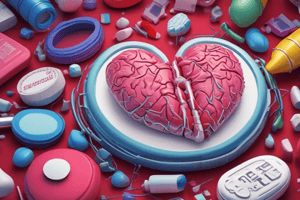Podcast
Questions and Answers
What do ACE inhibitors do?
What do ACE inhibitors do?
- Relax blood vessels and treat blood pressure (correct)
- Reduce the oxygen demands of heart muscle
- Increase potassium levels (correct)
- Dissolve blood clots
Name one medication that is classified as an ACE inhibitor.
Name one medication that is classified as an ACE inhibitor.
Lisinopril
What is the primary function of beta blockers?
What is the primary function of beta blockers?
- Increase heart rate
- Reduce the oxygen demands of the heart muscle (correct)
- Relax blood vessels
- Dissolve blood clots
List one type of medication that falls under calcium channel blockers.
List one type of medication that falls under calcium channel blockers.
What class of medications are used to decrease blood pressure by eliminating urine?
What class of medications are used to decrease blood pressure by eliminating urine?
Which of the following medications is classified as an anticoagulant?
Which of the following medications is classified as an anticoagulant?
What is the function of antiarrhythmic medications?
What is the function of antiarrhythmic medications?
Antiemetic medications are used to treat nausea and vomiting.
Antiemetic medications are used to treat nausea and vomiting.
Which type of medication is used to regulate body ability to handle stress?
Which type of medication is used to regulate body ability to handle stress?
What classification do drugs like morphine and hydrocodone fall under?
What classification do drugs like morphine and hydrocodone fall under?
Which of the following medications are classified as SSRIs?
Which of the following medications are classified as SSRIs?
What is the term for medications that treat allergic symptoms?
What is the term for medications that treat allergic symptoms?
What is the purpose of proton pump inhibitors?
What is the purpose of proton pump inhibitors?
Benzodiazepines are used to increase anxiety.
Benzodiazepines are used to increase anxiety.
Flashcards are hidden until you start studying
Study Notes
Cardiovascular Medications
- ACE Inhibitors: Relax blood vessels to treat high blood pressure; examples include Lisinopril, Captopril, and Enalapril.
- Beta Blockers: Decrease heart muscle oxygen demand and manage high blood pressure; notable examples are Propranolol, Atenolol, and Metoprolol.
- Calcium Channel Blockers: Reduce heart conduction, thereby relaxing the heart and treating hypertension; examples are Amlodipine and Verapamil.
- Diuretics: Lower blood pressure by reducing blood volume through increased urination; include Furosemide and Spironolactone.
- Vasodilators: Medications like Hydralazine act to relax and expand blood vessels.
- Anti-Hypertensives: A broad category reducing blood pressure, encompassing drugs like Lisinopril and Metoprolol.
Blood Thinners and Clot Management
- Anticoagulants: Medications that dissolve blood clots; common examples are Warfarin and Rivaroxaban.
- Antiarrythmic Medications: Used to manage and prevent irregular heart rhythms; key names include Amiodarone and Atenolol.
Gastrointestinal and Urinary Medications
- Antiemetics: Treat nausea and vomiting; include Ondansetron and Promethazine.
- Antidiarrheal Agents: Reduce frequency of diarrhea; include Loperamide and Bismuth subsalicylate.
- Laxatives: Help alleviate constipation; examples are Bisacodyl and Docusate.
- UTI Treatments: Improve urine flow; include Tamsulosin and Tolterodine.
Hormonal and Stress Management Medications
- Corticosteroids: Regulate stress response in the body; examples are Methylprednisone and Prednisone.
- Antiparkinson Medications: Manage symptoms of Parkinson’s disease; include Sinemet and Carbidopa-Levodopa.
- Anti-Alzheimer's Drug: Donepezil (Aricept) is used to treat Alzheimer's disease.
Mental Health Medications
- Antiepileptics: Used for seizure management; include Phenytoin and Carbamazepine.
- Stimulants: Often used for attention disorders; examples are Methylphenidate and Ritalin.
- Antidepressants (SSRIs): Used to treat depression; notable examples are Sertraline and Fluoxetine.
- Antipsychotic Medications: Manage psychotic conditions; key names include Quetiapine and Olanzapine.
- Benzodiazepines: Lower anxiety and stress; examples include Diazepam and Lorazepam.
Allergy and Inflammation Medications
- Antihistamines: Treat allergies; common examples are Loratadine and Cetirizine.
- NSAIDs: Nonsteroidal anti-inflammatory drugs that reduce inflammation and pain; include Ibuprofen and Naproxen.
- Analgesics: Pain relievers such as Acetaminophen and Morphine.
- Antipyretics: Medications that reduce fever; examples include Ibuprofen and Acetaminophen.
Digestive Health
- Proton Pump Inhibitors (PPIs): Reduce gastric acid production; examples are Pantoprazole and Omeprazole.
- Anti-diabetic Medications: Control blood sugar levels; include Metformin and Insulin.
Specialized Medications
- Antineoplastic Agents: Target cancer cells; examples include Methotrexate and Doxorubicin.
- Anticholinergics: Block parasympathetic nerve impulses; notable examples are Atropine and Scopolamine.
Receptor Types and Functions
- H1 Receptors: Histamine receptors involved in allergic response.
- H2 Receptors: Stimulate gastric acid secretion in the stomach, acting on parietal cells.
Potassium Levels
- ACE Inhibitors: Can lead to increased potassium levels; act by dilating blood vessels and lowering blood pressure.
Studying That Suits You
Use AI to generate personalized quizzes and flashcards to suit your learning preferences.




